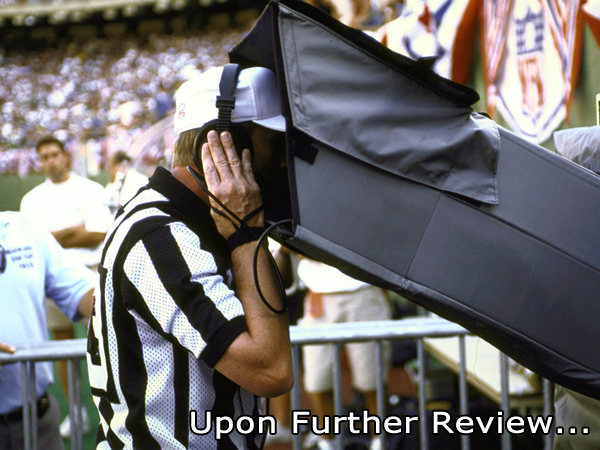
This weekend saw the birth of a new era for the NFL — Modified Sudden Death. For me, it is fortunate that the overtime game between the Denver Broncos and Pittsburgh Steelers did not reveal anything about the new era. Bellow is an excerpt of an article I wrote 21 months ago about the change to playoff overtime games followed by my thoughts after Sunday’s debut.
—————————
The former playoff method for dealing with games ending in a tie was identical to regular season games. A coin toss determines the initial possession of the football. The team scoring first wins the game in a “sudden death” fashion. The new rule, which only applies to the playoffs is referred to as “modified sudden death.” This dramatic change which has tongues wagging everywhere, states that the first team to possess the football cannot win the game by means of an initial field goal played in the overtime period. Committee co-chair and Atlanta Falcons General Manager, Rich McKay stated last week that this modification would produce the “fairest result.”
McKay goes on to state,
“I have a file that’s this thick with overtime recommendations and changes. …This idea, in our minds, did the right thing for football. It kept the football decisions the same. It kept the strategy the same. It dealt with the statistical advantage that had occurred from the coin toss, which we didn’t think was fair.”
Modified sudden death now states that if the team to initially possesses the football manages only a field goal, the other team shall be given an opportunity to also attempt a score. It will now be in the best interest of the team first possessing the football to score a touchdown rather than a field goal. Where formerly a field goal would have ended the game, the opponent is now given their own chance to either tie the game with a field goal of their own, or score a touchdown and win the game.
Why the controversy? The majority of dissentions fall along one of two lines: first, the rule requires a complete overhaul to the strategy of how playoff overtime is managed, and/or secondly the rule change fails to go far enough in addressing the crux of the issue. Ironically, all dissenters agree that the system previously employed was flawed — they just wish the new rule had been even more different.
Regardless of playoffs or regular season games, most believe sudden death itself lies at the heart of the present overtime problem. While there are a those who believe that the present system should not be meddled with and that the status quo be maintained, most prefer sudden death be eliminated entirely. They favor a shortened overtime period be played so that the game is kept closer to the heart of football. Most would prefer the offense and defense be the determining factor in the outcome of the game — not a kicker.
Modified sudden death will certainly be argued about for some time. Since most coaches and fans seem to favor something different, sudden death itself may require killing. It seems clear that the NFL made progress on an issue which has been contentious for some time. Unfortunately, progress frequently does not equal perfection — and that certainly seems the case here.
——————————
After the Broncos overtime win, I think the rule change is a disaster. It is fortunate that the first opportunity to implement the rule did not affect the outcome of the game, but it made clear the inherent problems with the “modified” system. For the first time ever a franchise (especially the coaching staff) was faced with a likely game changing situation and its implications at the most critical time in the season (the playoffs). It was clear the moment Ron Winter “tried” to explain the new rules just prior to the overtime coin toss that this was no small change. The head official could not get the words out of his mouth in any intelligible manner.
If this new system were to be successful, the time to initiate the changes was in the preseason — NOT THE POSTSEASON! Instead of continuing, the League should abandon this farce NOW and return to the status quo. Bring in the new changes next preseason. The solution is quite simple: have each game, regardless of the outcome, conclude with the new tie breaking scenario and give the teams multiple weeks to work with the new scheme and its implications. This solution seems prudent, practical, and the best way to ensure fairness for these most important games.




Good article Jeff. The NFL continues to change its rules from one year to the next, trying to perfect the game. In one way it’s good that they try to progress the game, but it’s mostly just distracting. An an official in Britain I am frequently confronted by players and even coaches who learn their rules from the NFL; every time a player tries to report himself as an ‘eligible receiver’ I feel the need slap the coach around the face. I fear this rule, and the extra exposure it has now had, will create some friction if I have to officiate a game which goes into overtime. Not that it matters so much, weirdly enough a nation whose main sport revolves around kicking can’t seem to produce any decent kickers and field goals are a last ditch attempt and not a fairly safe bet even around the 20 yard line…
I completely agree with your conclusion though; if the league is going to implement this, THEY NEED TO START IT IN THE PRE-SEASON! Overtime is not the most common occurrence but it happens enough to test it more than a few times over a whole season.
Though I don’t necessarily agree with the change in the first place. If the teams have proved that their offence and defence have been evenly matched over 60 minutes of football, why not let a kicker go for the game-winner? I’d say a coin toss is the epitome of ‘fair’, and if you win you still have to drive into field goal range. Besides, one of the most iconic and breathtaking moments in a game is when a Kicker attempts the game-winning field goal and the crowd waits with bated breath as it sails through the air…
Wasn’t this the rule LAST year in the playoffs? It only happened that there were no OT games last year. Even with the old rle, Denver would still have won. New rule, old rule, Pitt did NOT play good defense on that play. The gambled on the run and lost.
My how time flies. I thought the rule began this season. Upon further review it was decided upon March 2009! That’s when I first wrote about this. My complaint is not about how it turned out, but that it was implemented in this fashion.
Jeff, since you claim you only have a problem with the implementation, what’s the deal? Is it a good rule or not? Personally I think it is a huge improvement over the previous rule, and hey, win the game in regulation! Also, if people can’t figure this rule out, then they are frickin morons. Not my problem!(except for the fact that they are eligible to vote)
I don’t see how you can have a problem with this rule change. If you take it to the extreme, if it ends tied in regulation then just flip a coin and the winner of the coin toss wins the game. Clearly nobody would be happy with that. The rule change simply means that winning the coin toss is less important than it was previously. It isn’t very complicated. I think that Peter King has it right though, the NFL should take it one stage further so that there is a guarantee of at least one possession for each team, which would make the referee’s explanation simpler. I find that the referees in football often garble their explanations of the rules, that in and of itself doesn’t change anything.
In my opinion, making the coin toss in OT less important can only be a good thing.